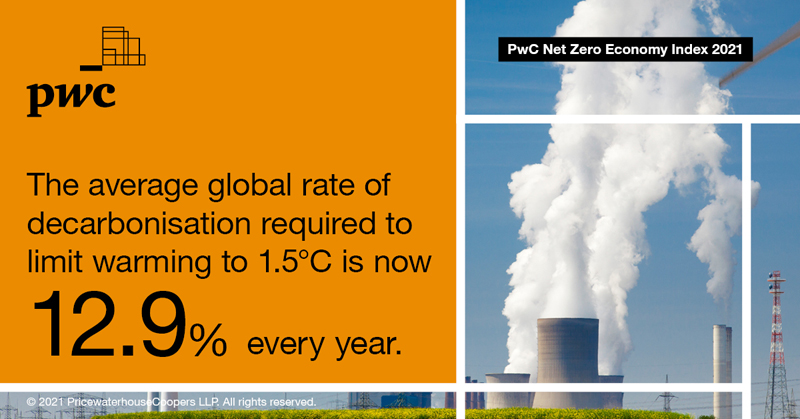PwC Net Zero Economy Index 2021 Findings
The PwC Net Zero Economy Index 2021 “finds that a decarbonisation rate of 12.9% – more than five times greater than what was achieved over the last year [2.5%] and eight times faster than the global average over the course of the 21st century – is required to halve global emissions by 2030 and to reach net zero by mid-century.”
A spokesperson said, “The rate of decarbonisation required to achieve the 1.5°C objective set out in the Paris Agreement is five times as challenging, following a short-lived Covid-19 related decline in global emissions.
“As world leaders prepare to head to the UN Climate Summit – COP26, the PwC Net Zero Economy Index 2021 finds that a decarbonisation rate of 12.9% – more than five times greater than what was achieved over the last year [2.5%] and eight times faster than the global average over the course of the 21st century – is required to halve global emissions by 2030 and to reach net zero by mid-century.
“COP26 – in Glasgow from 31 October to 12 November – has the herculean task of accelerating climate action. All sectors of the economy will need to transform to deliver net zero.”
Arthur Wightman, PwC in the Caribbean ESG leader and PwC Bermuda leader, said, “Over the past year, businesses and governments have significantly stepped up their ambition to act on climate change, however, the emissions gap continues to widen.
“We must heed what the climate science is telling us – higher ambition and an acceleration of action is needed to keep 1.5°C in striking distance.”
Marisa Savage, ESG partner, PwC Bermuda, said, “Climate change matters to every business in every sector. It cannot be ignored, with ESG pressures intensifying from a broad group of stakeholders – including investors, regulators, consumers and employees.”
The spokesperson said, “Even with the global economic slowdown in 2020, no country in the Group of 20 [G20] was able to achieve the 12.9% rate of decarbonisation required to limit warming to 1.5°C. Only a handful of countries have ever successfully achieved double-digit rates of decarbonisation.
“Although the majority of the G20 have set ambitious climate targets, these have yet to translate into clear policy actions that will deliver the changes needed. See the G20 performance here.
“Global energy demand fell by 4.3% in 2020, leading to a reduction in energy related emissions of 5.6% [from 2019 levels] as well as a decline in total global emissions.
“As a result, the rate of global decarbonisation [reduction in carbon intensity: energy-related CO2 emissions per dollar of GDP] reached 2.5%, but this was just a slight increase from the 2019 rate of 2.4%. However, the emission reduction resulting from this energy demand anomaly still falls way short of the progress needed to keep the temperature rise below 1.5°C.
“PwC firms are participating in a number of discussions and events at COP26, including:
- “ESG Daily Webcast Series: Delivering sustainable value creation; Enabling transformation through radical and responsible change; and Creating opportunities for all through a fair transition. Register here.
- “ICC Make Climate Action Everyone’s Business Forum, moderated by Agnieszka Gajewska, PwC Global Government & Public Sector leader and PwC CEE ESG Leader; and Richard Abadie, PwC Global leader of Capital projects & infrastructure.
- “What to Watch Daily Briefing at COP26 in Glasgow presented by PwC focusing on hot topics related to the conversations at COP26.”
Read More About
Category: All, Business, Environment





Will never happen. Also how many will die as a result of this. No cars, bikes, air planes. The green new deal and global aligning of tax will level the playing field alright. It will destroy it. The Great Reset.
LOL enjoy “you will own nothing and you will be happy”